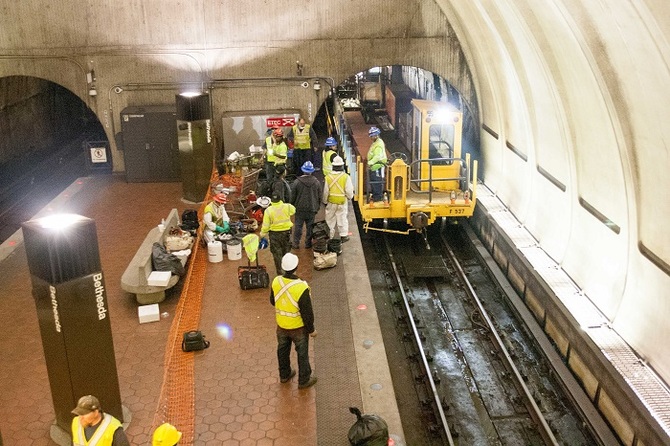 Repair work takes place at Bethesda Metro station. PHOTO BY MARK POETKER, COURTESY THE SENTINEL Repair work takes place at Bethesda Metro station. PHOTO BY MARK POETKER, COURTESY THE SENTINEL By Madeline Merrill By the time I made my daily trek to the bus stop, I was already drenched in sweat. The sun was just barely peeking over the Washington skyline as I and other WMATA passengers were fishing in the deep recesses of our pockets, backpacks, purses, and wallets for our MetroCards. From May 23 until August 12, I bemoaned the District of Columbia’s public transit system, often complaining that the buses ran behind schedule, or that there were never any open seats. It seemed like every day, another metro station was closed for maintenance. Overflowing buses would often breeze past my bus stop, too full to take on more passengers. My summertime woes, however, were exactly that--summertime, temporary struggles. For full-time, permanent resident of the DC metro area, the Metrorail restructuring lasted much longer than thirteen short weeks. WMATA lag times and closed stations translate to logistical headaches. Commutes that normally last twenty or thirty minutes become more than an hour (each way) for those residents in particularly difficult-to-reach areas. As many DC residents are intimately aware, the WMATA Metrorail system is undergoing heavy construction due to safety concerns. The public transportation system upgrades escalated quickly into a planning nightmare for residents who lived further than walking distance from work. What was previously a simple, one-way metro ride became a commute of several transfers, from metro to bus, and then back to the Metrorail again. As I was just an intern in the District, my supervisor was more than understanding about any transportation hiccups. My summer was about the experience--not about “logging hours” or producing countless deliverables. But for those residents of DC who need to be exactly at a certain place at a certain time, whose livelihood depended on their ability to be mobile, the metro overhaul and bus shortage presented a logistical, almost insurmountable, challenge - a challenge largely directed towards the District’s poorest and most geographically isolated families. Nearly seventy percent of low-income workers in America do not have the option to reschedule their start or stop shift time, if needed[1]. Whenever a mass public transit system undergoes construction or repairs, the working poor are disproportionately affected. “Public transportation is desired by many, but is even more important for lower-income people who can't afford cars,” says Rosabeth Moss Kanter, a Harvard University professor.[2] Each day I witnessed this socioeconomic differentiation in DC. As the Metrorail became more unpredictable, the DC streets clogged with cars--and the working poor were left to ride the buses, to walk, or find another means to get to work. A quick glance at the DC metro system map illustrates this shortcoming of many public transit systems--there are limited access points, which are often few and far between in low-income neighborhoods. Add to that mixture unpredictable bus schedules, escalating Metrorail fares, and interrupted metro lines, and you have a recipe for limited, or even nonexistent public transportation in select areas for those who need public transportation the most. Furthermore, DC’s distance-based pricing adds an interesting twist to an already complicated class-based issue. In the District, consumers pay by how many stops they travel--unlike most American rapid transit systems, which issue a flat fee for a one-way ride to an entirely different neighborhood or part of the city.[3] Residents who can afford to live further from the city center do so-often choosing to reside in more desirable, safer neighborhoods. But those residents who cannot afford more than the $1.75 bus fare each way are indirectly forced to live in select sections of the District with already limited transportation options. Middle to upper income residents can more easily swap to Capital Bike Share, to Uber, to Lyft...but for those residents without access to a credit or debit card (another class-based policy issue), or families without extra cash to spare for transportation, an even more inflexible WMATA schedule translates to increased stress about how to get from Point A to Point B. In fact, only eight percent of Capital Bike Share members are low-income, compared to the forty-five percent of bike users who reside in households that earn more than $100,000.[4] As policy makers, our work is cut out for us. WMATA leadership, transportation shared-services providers, and municipal officials must rethink how a person’s zip code limits opportunity and inhibits economic advancement. Two hours spent on public transportation is time away from children, from prepping healthy meals, from self-care. As our nation’s capital revolves increasingly around Uber, Lyft, and Bike Share, we must continue to ensure that the District’s lowest-income neighborhoods are able to access these resources--and that they are coming along for the ride. [1]http://www.huffingtonpost.com/chelsea-kiene/when-major-metro-shuts-down-low-income_b_9479638.html [2]http://www.theatlantic.com/business/archive/2015/05/stranded-how-americas-failing-public-transportation-increases-inequality/393419/ [3]https://the-city-space.com/2013/07/01/public-transit-trends-what-a-bus-ride-can-tell-you-about-race-and-class/ [4]http://greatergreaterwashington.org/post/25115/how-to-make-shared-vehicle-services-accessible-to-people-of-all-incomes/
0 Comments
Your comment will be posted after it is approved.
Leave a Reply. |
Categories
All
Archives
April 2022
|
ADDRESSVirginia Policy Review
235 McCormick Rd. Charlottesville, VA 22904 |
|
SOCIAL MEDIA |